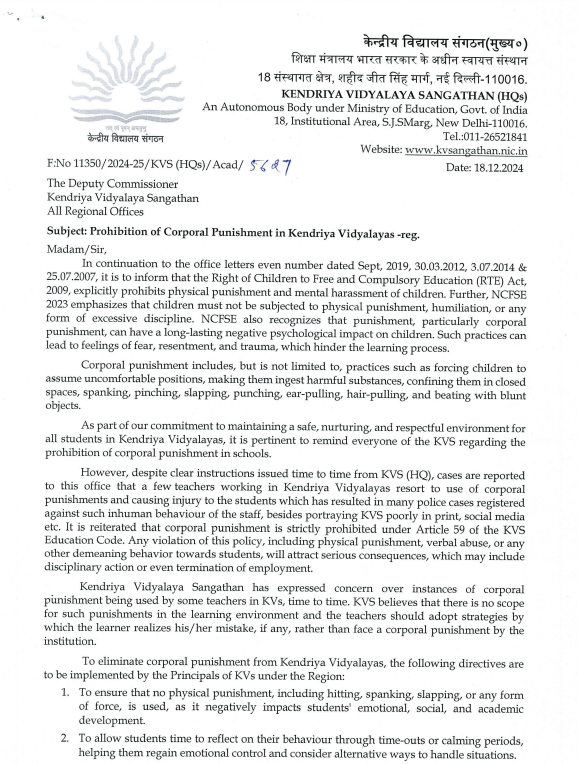
Prohibition of Corporal Punishment in Kendriya Vidyalayas: A Progressive Step Towards Holistic Education
The prohibition of corporal punishment in Kendriya Vidyalayas (KVs) marks a significant milestone in fostering a safe, nurturing, and conducive learning environment for students. Kendriya Vidyalayas, established under the aegis of the Ministry of Education, Government of India, aim to provide quality education while inculcating values, discipline, and respect among students. The decision to ban corporal punishment aligns with global educational practices, human rights principles, and the philosophy of child-centered education.
Understanding Corporal Punishment
Corporal punishment refers to physical discipline used to correct or control a student’s behavior. This can include actions like slapping, caning, or any form of physical coercion. Historically, corporal punishment was considered an acceptable form of discipline, but research and modern pedagogical approaches have consistently highlighted its adverse effects on children’s physical, emotional, and psychological well-being.
Legal and Ethical Frameworks Supporting the Ban
India’s legal framework strongly opposes corporal punishment, particularly in educational institutions. The Right of Children to Free and Compulsory Education (RTE) Act, 2009, explicitly prohibits physical punishment and mental harassment of children under Section 17. Furthermore, Article 39(e) and (f) of the Indian Constitution emphasize the protection of children from abuse and exploitation, ensuring opportunities for healthy development in conditions of dignity and freedom.
Internationally, the ban on corporal punishment in Kendriya Vidyalayas aligns with the United Nations Convention on the Rights of the Child (UNCRC), which India ratified in 1992. Article 19 of the UNCRC obligates member states to take all necessary measures to protect children from all forms of physical or mental violence. By upholding these legal and ethical commitments, Kendriya Vidyalayas are setting a benchmark for other educational institutions across the country.
The Rationale Behind the Ban
- Adverse Psychological Effects: Research shows that corporal punishment can lead to anxiety, depression, and low self-esteem among students. Such practices instill fear rather than respect, hampering the overall personality development of children.
- Negative Impact on Academic Performance: Students subjected to physical punishment often experience diminished concentration, reduced interest in learning, and poor academic outcomes. A nurturing environment, free from fear, is essential for academic success.
- Promotion of Violence: Corporal punishment often normalizes violence, teaching students that physical force is an acceptable means of resolving conflicts. This contradicts the values of empathy, cooperation, and peaceful conflict resolution that education seeks to instill.
- Legal Consequences: Teachers and school authorities engaging in corporal punishment face legal repercussions under the RTE Act and other child protection laws. This ensures accountability and discourages such practices.
- Fostering Positive Teacher-Student Relationships: A ban on corporal punishment encourages the development of healthy and respectful relationships between teachers and students. Such relationships are critical for a supportive learning atmosphere.
Alternatives to Corporal Punishment
The prohibition of corporal punishment does not imply a lack of discipline in schools. Instead, it necessitates the adoption of alternative, positive discipline strategies that respect the dignity and rights of students. Some of these strategies include:
- Positive Reinforcement: Recognizing and rewarding good behavior encourages students to adhere to rules and meet expectations without fear.
- Counseling and Guidance: Addressing behavioral issues through counseling helps students understand the consequences of their actions and develop self-discipline.
- Restorative Practices: Encouraging students to take responsibility for their actions and make amends fosters accountability and empathy.
- Setting Clear Expectations: Establishing clear, consistent, and age-appropriate rules ensures that students understand acceptable behaviors and the rationale behind them.
- Building a Supportive Environment: Creating a positive school culture where students feel valued and respected reduces instances of misbehavior and the need for punitive measures.
Implementation of the Ban in Kendriya Vidyalayas
Kendriya Vidyalayas have adopted a multi-pronged approach to enforce the ban on corporal punishment effectively:
- Teacher Training: Regular workshops and training sessions equip teachers with the skills and techniques to manage classrooms without resorting to physical punishment.
- Awareness Campaigns: Educating students, parents, and staff about the harmful effects of corporal punishment fosters a collective commitment to its prohibition.
- Complaint Mechanisms: Establishing robust grievance redressal mechanisms allows students to report incidents of corporal punishment without fear of reprisal.
- Monitoring and Evaluation: Periodic monitoring ensures compliance with the ban, and feedback mechanisms help refine disciplinary practices.
The Broader Impact
The prohibition of corporal punishment in Kendriya Vidyalayas reflects a broader commitment to child rights and quality education. It emphasizes the importance of empathy, respect, and non-violence as core values in education. By fostering an environment where children feel safe and valued, Kendriya Vidyalayas contribute to the holistic development of students, preparing them to be responsible and compassionate citizens.

Challenges and the Way Forward
While the ban is a progressive step, its successful implementation requires overcoming certain challenges:
- Resistance to Change: Some educators and parents, accustomed to traditional disciplinary methods, may resist adopting new approaches.
- Capacity Building: Continuous training and resources are necessary to equip teachers with effective alternatives to corporal punishment.
- Cultural Attitudes: Addressing societal norms that condone physical punishment requires sustained advocacy and awareness efforts.
- Monitoring Compliance: Ensuring adherence to the ban across all KVs necessitates robust oversight and accountability mechanisms.
By addressing these challenges through collaborative efforts involving educators, parents, policymakers, and students, Kendriya Vidyalayas can strengthen their commitment to providing a safe and supportive learning environment.
Conclusion
The prohibition of corporal punishment in Kendriya Vidyalayas is a testament to the evolving educational ethos that prioritizes the well-being and dignity of students. It underscores the importance of nurturing a generation of learners who are confident, empathetic, and respectful. By embracing positive discipline strategies and fostering a culture of respect and understanding, Kendriya Vidyalayas are paving the way for a brighter, more inclusive future in education.
